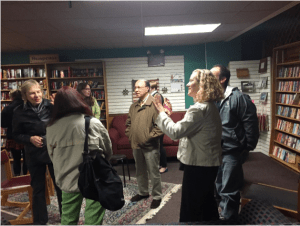Editor’s Note: Emma Slotterback is a student at Bloomsburg University who is writing a series of articles for Blogging Woolf in advance of the 25th Annual International Conference on Virginia Woolf: Virginia Woolf and Her Female Contemporaries, which will be held June 4-7 at Bloomsburg University in Bloomsburg, Pa. This is the third article in the series.
By Emma Slotterback
As an aspiring high school teacher, I believe our involvement with the Bloomsburg Area High School and the Berwick Area High School is one of the most exciting relationships we have developed due to the conference. Continuing our effort towards building a new generation of Woolf scholars, we came up with another idea that would not only build connections within our town, but also encourage young people to read and write about Woolf.
We reached out to two local high schools and connected with two high school English teachers. We also collaborated with Dr. Michael Sherry who was previously an English professor at Bloomsburg University. Our goal was to extend an invitation to high school students to expand their knowledge on Woolf and develop papers that could be presented at the conference.
Both the teachers and the students were thrilled about this opportunity and began planning accordingly. We sent the teachers multiple lesson plans that could be used to teach Woolf and Dr. Sherry provided the students with copies of Woolf’s Mrs. Dalloway. The students began reading and discussing the book and each student came up with his or her own paper proposal.
Similar to what we did with the undergraduates, we took the students’ papers and sorted them into panels. These panels are also going to run alongside scholarly panels. To prepare for this, work study students such as myself and Megan Hicks have taken multiple trips to the local Bloomsburg Area High School to work with these students. During these trips, Megan and I would discuss the conference and ease any public speaking related anxieties the students might have. During one of our visits, we formed two small group of students and each student practiced reading his or her paper out loud. Practicing gave Megan and me the opportunity to give the students constructive criticism and praise.
The high school students will be presenting on Thursday and will be encouraged to attend all of the conference related events on that day. Many students have expressed interest in attending many scholarly panels. After reading and writing on Woolf for an entire semester, these students are extremely excited to connect their schoolwork with outside experience and be able to develop new ways of thinking after hearing the ideas of others. This aspect of the conference is providing young people with experiences that will further their love for modernism and Woolf, as well as paving the way for the future generation of Woolf scholars.
scholarly panels. After reading and writing on Woolf for an entire semester, these students are extremely excited to connect their schoolwork with outside experience and be able to develop new ways of thinking after hearing the ideas of others. This aspect of the conference is providing young people with experiences that will further their love for modernism and Woolf, as well as paving the way for the future generation of Woolf scholars.








You must be logged in to post a comment.